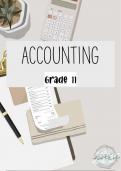Summary
Grade 11 Accounting Summary
- Course
- Institution
The Grade 11 Accounting Notepad is a comprehensive and colorful guide to accounting principles. It includes clear explanations of general ledger accounts and double-entry principles, as well as specific guidance on inventory accounts, closing transfers and partnerships. Designed for students in Gra...
[Show more]



